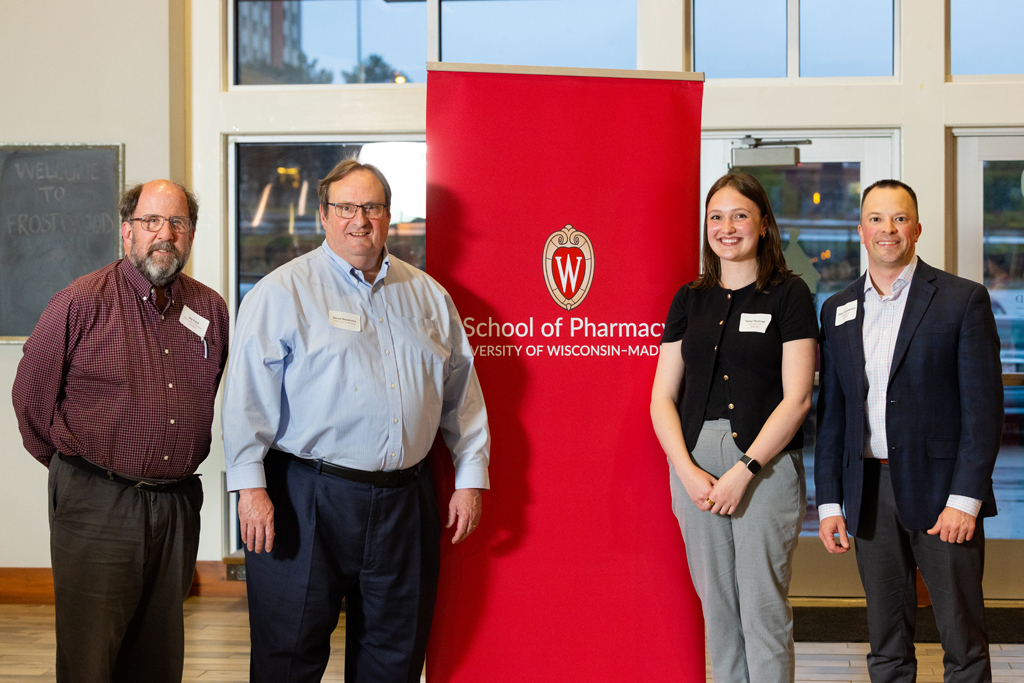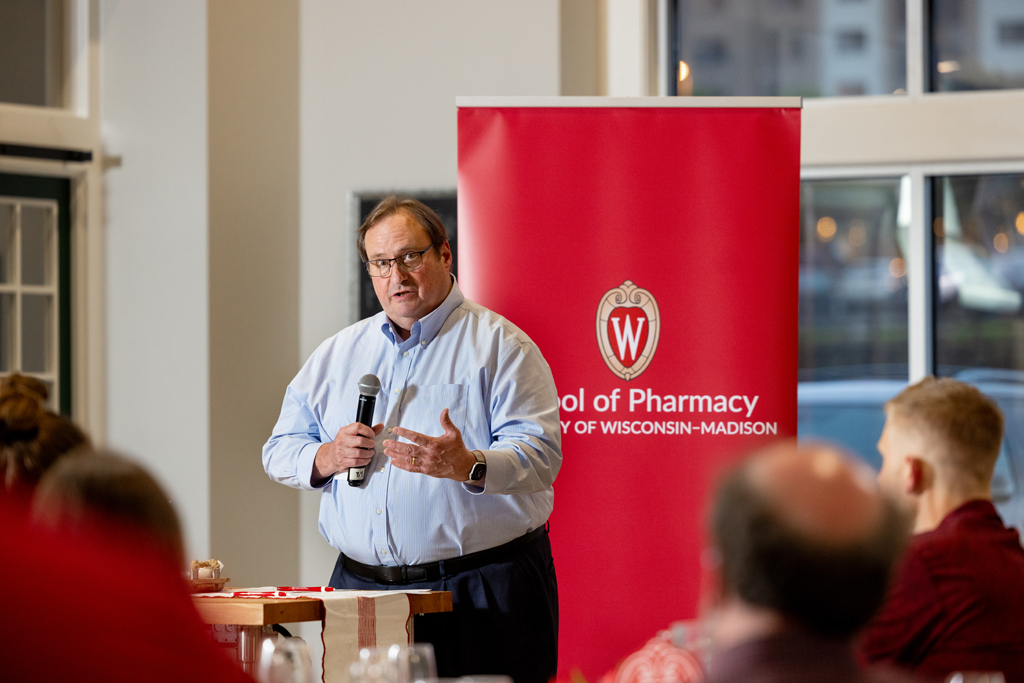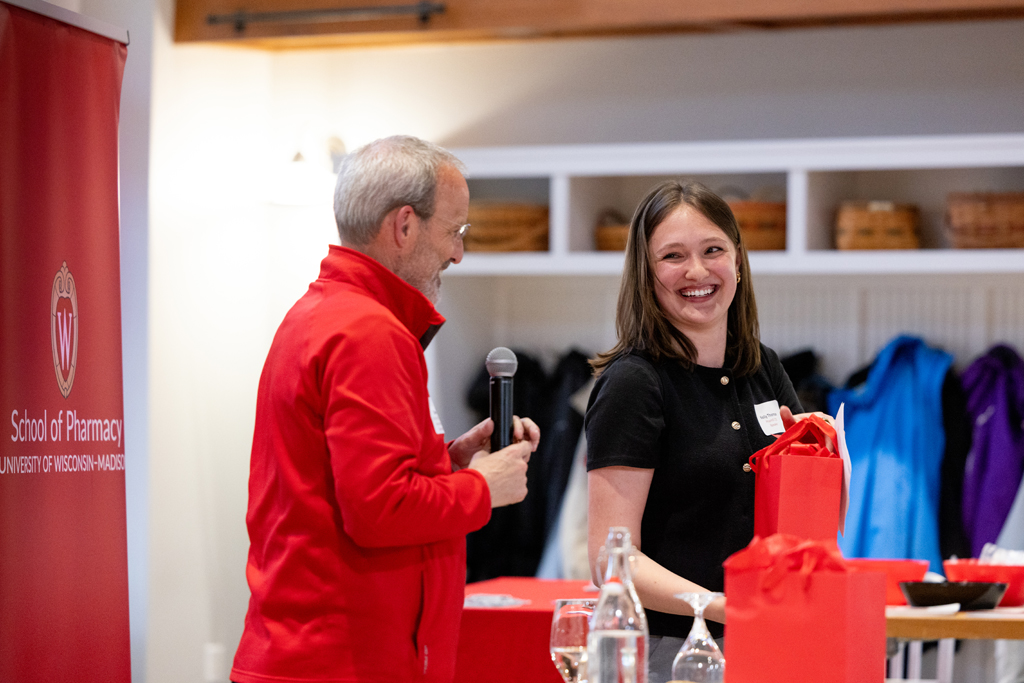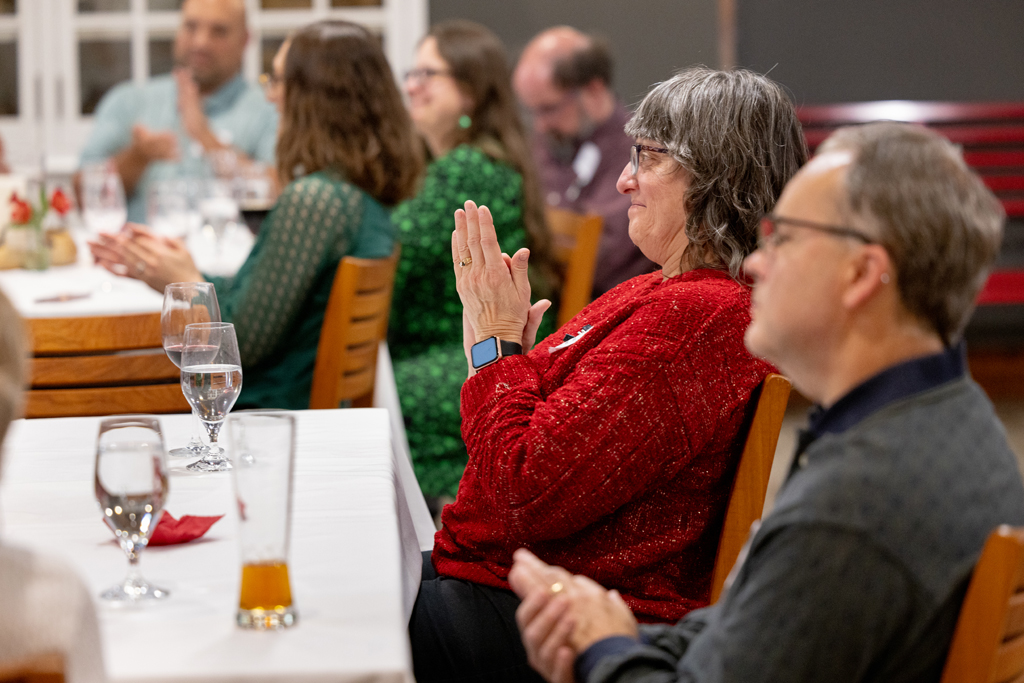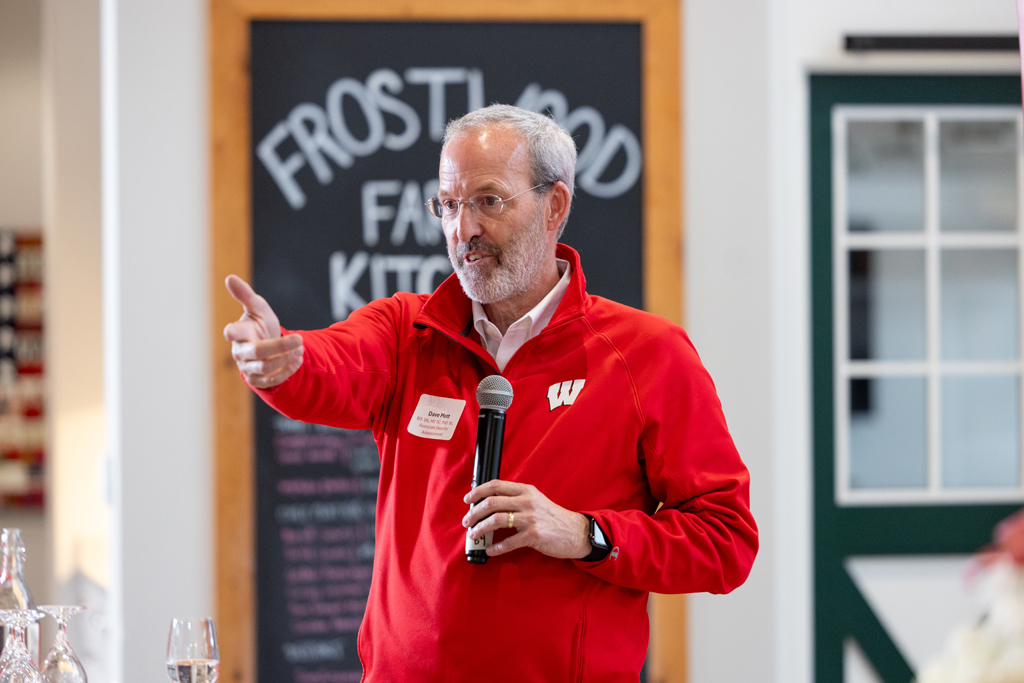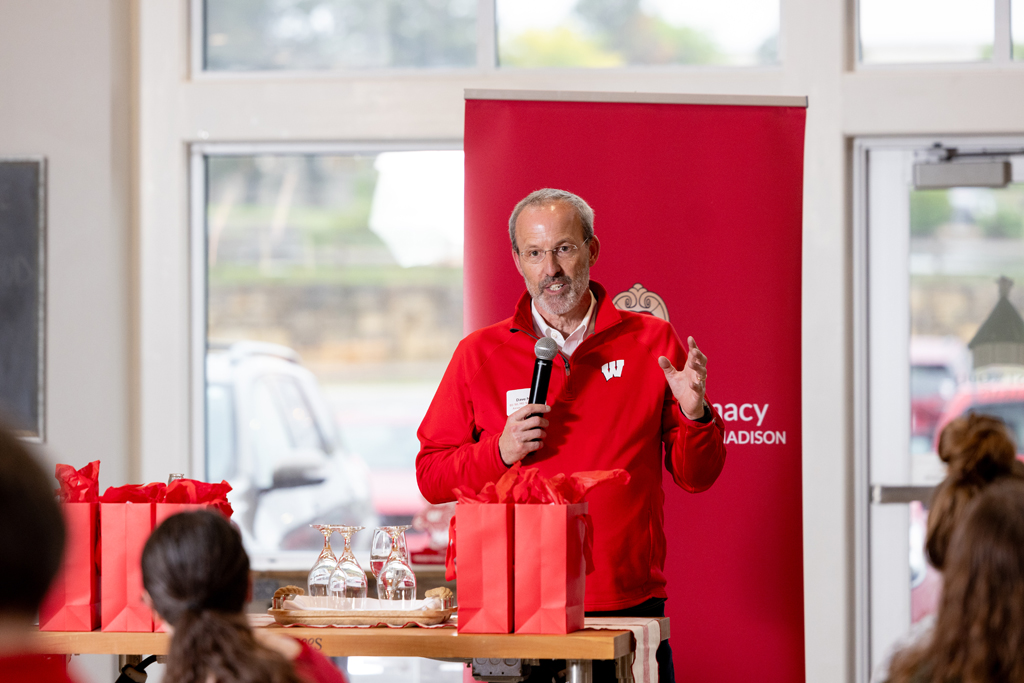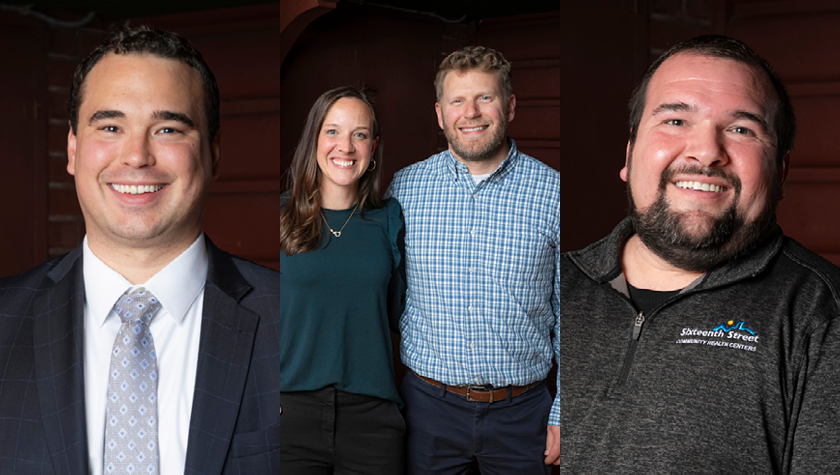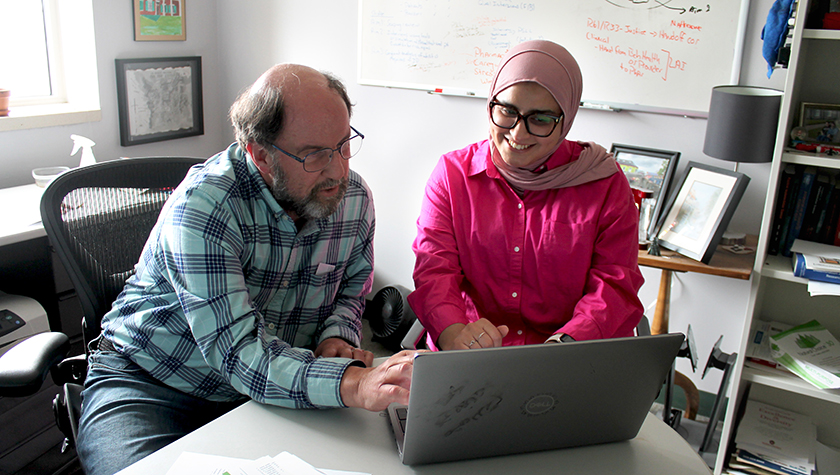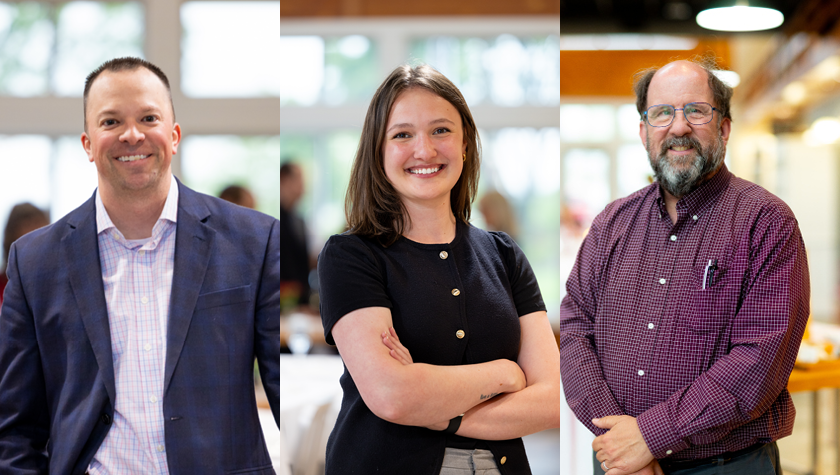
UW–Madison School of Pharmacy alumni and faculty share how they’ve been transforming patient outcomes, from opioids to heart failure and cancer care
By Logan Underwood
In a small-town clinic in Monroe, Wisconsin, a patient who once relied on a walker now strides in unassisted — a transformation sparked not by surgery or a new gadget, but by a pharmacist’s guidance. It’s just one example of how University of Wisconsin–Madison School of Pharmacy alumni are redefining what it means to be a pharmacist, innovating at the front lines of patient care.
At the School’s Madison Innovators alumni and friends reception on May 23, three Pharmacy Badgers — Associate Professor Jay Ford, Kelly Thomas (BS ’20, PharmD ’23), and Jason Bergsbaken (PharmD ’12) — took the stage to share how they’re leading change in their communities, from combating opioid overdoses to transforming heart failure care and advancing cutting-edge cancer therapies.
“We know that healthcare is changing and becoming very complex. A lot of times, our pharmacists are being called upon to deal with these serious issues and serious challenges,” says Associate Dean for Advancement Dave Mott (BS ‘88, MS ‘92, PhD ’95). “Our Innovators event series is really designed as a chance for our Pharmacy Badger community to share with us what they’re doing that’s new, inspiring, motivating, so we can learn from those activities.”
Equipping pharmacists to save lives
Ford, a professor in the School’s Social Administrative Sciences Division, has been working to systematically change and improve community pharmacy and behavioral health settings for decades. In his latest endeavor, he is partnering with Associate Professor Cody Wenthur, of the Pharmacy Practice and Translational Research Division, to launch the Wisconsin Opioid Overdose Response Center (WOORC).
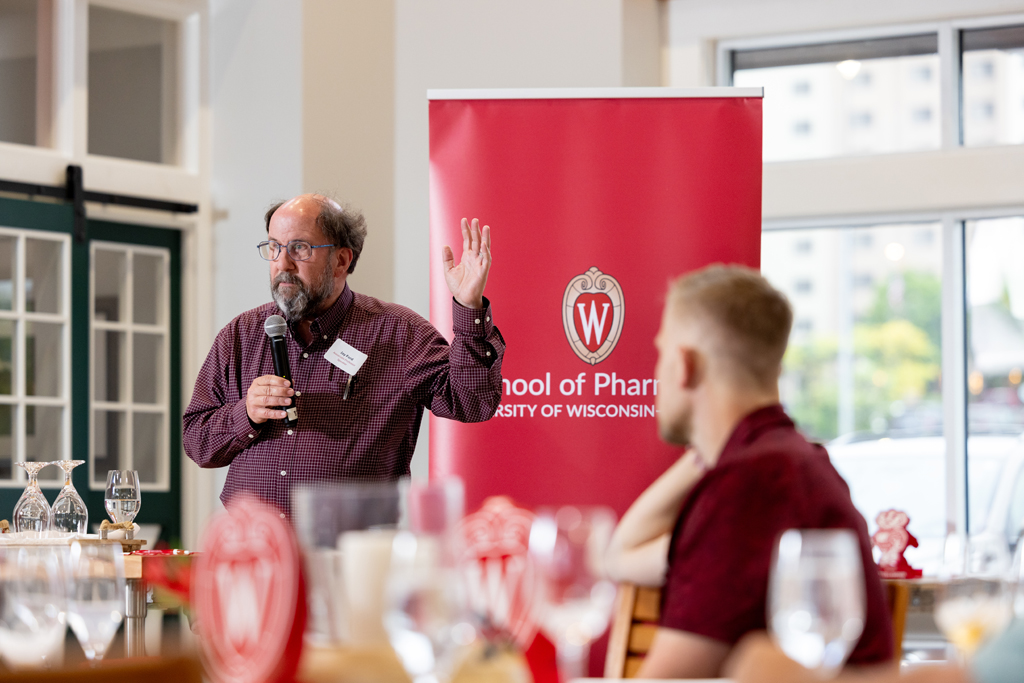
The goal of the center, funded by a $2 million federal appropriation, is to equip pharmacies with opioid overdose emergency medicine and treatments for opioid use disorder, expanding healthcare access to patients.
“Pharmacists are some of the most trusted people in the community, and we all live within 5 miles of a community pharmacy,” says Ford. “That puts the community pharmacy, the pharmacists, and the technicians that are there in a unique position to help address the opioid epidemic in Wisconsin.”
Since first starting the project in September, Wenthur and Ford have engaged 62 pharmacies in Wisconsin — many of them community pharmacies — with their mission.
The team is working to provide these community pharmacies with fentanyl and xylazine testing strips, naloxone, and patient-centered educational brochures in English, Hmong, Spanish, and Russian.
“We are leading the way to enable community pharmacies to be at the forefront of solutions to the opioid overdose epidemic in the state of Wisconsin,” says Ford. “We’re leveraging your expertise as pharmacists to increase access to evidence-based treatment approaches for individuals with an opioid use disorder, and we’re developing the next generation of tools to identify and mitigate the harms arising from novel opioid molecules.”
Battling heart failure
Despite only graduating from the School of Pharmacy in 2023, Thomas has already improved the quality of life for a countless number of patients. Thomas is currently working to finish her PGY2 pharmacy residency in ambulatory care at the SSM Health Monroe clinic, where she is focusing on expanding pharmacy practice, managing chronic conditions, and educating patients in an outpatient rural health setting.
Most recently, Thomas has been working with patients experiencing chronic conditions, such as diabetes, heart failure, and anticoagulation. To make broad improvements in health and healthcare access, Thomas works individually with these patients to comprehensively understand their needs.
Taking a special interest in heart failure patients, the clinic uses heart failure guideline-directed medical therapy (GDMT). This therapy takes a multidisciplinary approach to heart failure, utilizing multiple specialists — including pharmacists — to better understand the complexities of each patient.
“GDMT can help patients feel better, they can live longer, and they stay out of the hospital,” says Thomas. “Despite the life-changing effects that these therapies can have, they’re still severely underutilized.”

When a pharmacist is involved in heart failure management, Thomas says patients see 28% fewer hospitalizations, gain a clearer understanding of the condition, and experience better adherence to treatments. With faster implementation and optimization of GDMT, patients also experience 37% lower costs in the three months following a pharmacist visit, along with improved mobility.
“We noticed that 80% of patients who were coming to us, either immobile or using a cane or a walker to get around, were able to actually walk independently by the time they had reached optimized GDMT and were done working with us,” says Thomas.
In July, Thomas will be starting the heart failure-based services at the SSM Health heart failure clinic in Madison, where she will be able to expand access to GDMT.
“The outcomes from this project confirm we are a key asset in heart failure management and should be utilized more,” says Thomas.
Personalizing cancer treatment
According to Bergsbaken, UW Health’s pharmacy coordinator of regional oncology services, around 40% of people in the United States are expected to develop cancer at some point in their lives. In part due to its increasing prevalence, cancer treatments are constantly evolving.
“Overall five-year survival rates of all cancers in the 1970s were about 50%. They’ve grown today to almost 70%,” says Bergsbaken. “We’ve had over 600 Food and Drug Administration approvals since 2000 within the cancer space, including over 30 in just the last two years.”
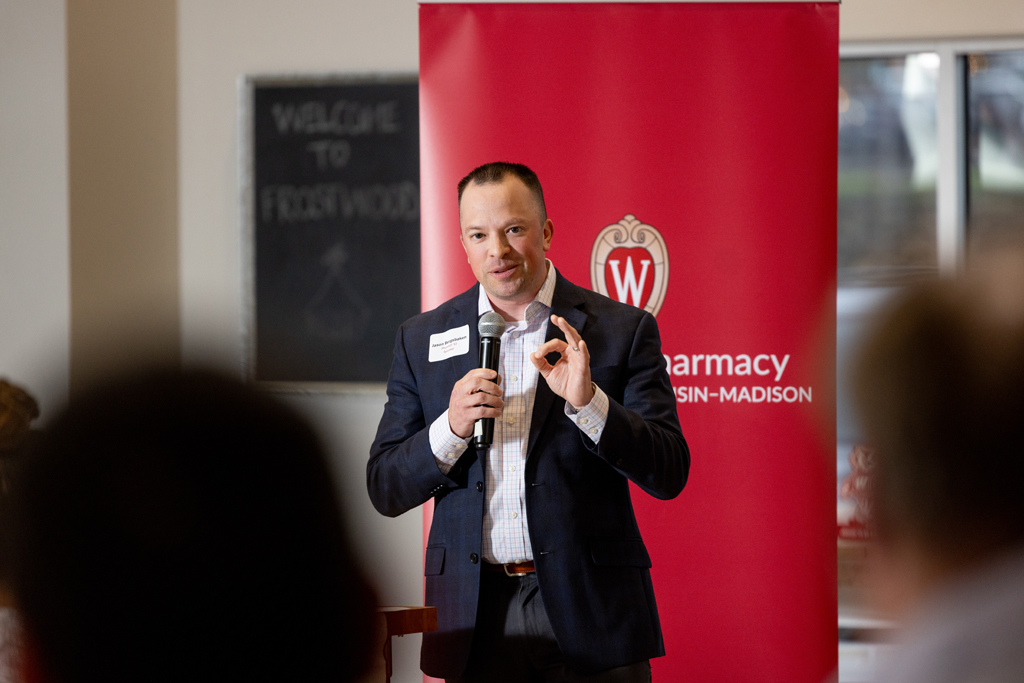
Bergsbaken coordinates the institutional Oncology Pharmacy and Therapeutics Committee at UW Health’s Carbone Cancer Center, where the team works to provide patients with as many appropriate therapy options as possible, including the newest innovations in cancer care.
Lately, Bergsbaken and other oncology pharmacist team members are increasingly focused on using targeted therapies unique to each patient’s cancer. Bergsbaken recognizes cell and gene therapies as two of the most current innovative treatments.
“In the case of cellular specifically CAR T-cell therapies, we’re actually genetically engineering a patient’s own T cells to attack cancer cells, using an individualized approach to help treat that specific cancer type,” says Bergsbaken.
Gene therapies use a similar customized approach, altering a patient’s own genetic material to treat — or hopefully cure — the disease. As of early 2025, there are currently seven FDA-approved CAR T-cell therapies, with indications focused on hematologic malignancies such as leukemia, lymphoma, and multiple myeloma.
Approvals in gene therapy drugs are also starting to enter the market, specifically with two therapies to treat sickle cell disease being approved in late 2023.
While the individualized approach of using gene and cellular therapies is making breakthroughs in patient care, Bergsbaken recognizes several current challenges with the treatment.
“These Innovators talks are another great example of what’s going on in the School of Pharmacy, with our alumni going out into Wisconsin and really making a difference in the communities.”
—Steve Swanson
“Published costs for CAR T-cell therapies range from $500,000 to $1 million, whereas published costs for previously approved sickle cell gene therapies run approximately $2 and $3 million, respectively. These treatments have the ability to cause shocks to our health care system in terms of the cost of care,” says Bergsbaken. “Another challenge is potential for toxicity. These therapies possess specific toxicity profiles, many of which require intensive and specialized monitoring with a pharmacist involved.”
In other examples, Bergsbaken highlighted breakthroughs in using BiTE (bispecific T-cell engager) therapies, as well as immunotherapies, in attacking cancer.
“That’s what we all want — personalized approaches, modern approaches, science-based advances. That’s going to lead to better care, better outcomes for patients, and lower costs,” says Steve Swanson, dean of the School of Pharmacy. “These Innovators talks are another great example of what’s going on in the School of Pharmacy, with our alumni going out into Wisconsin and really making a difference in the communities.”
